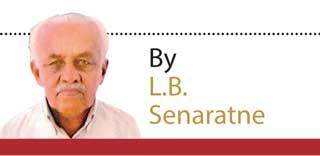18 Sep 2021 - {{hitsCtrl.values.hits}}
The inventor of this machine, which is said to be 97.5 % efficient compared to the present PCR machines, states that it is now in the patent list in the country
 The University of Peradeniya is not an institution in a restricted environment, but an institute working for the benefit of mankind, whether in the field of education or in the advancement of science.
The University of Peradeniya is not an institution in a restricted environment, but an institute working for the benefit of mankind, whether in the field of education or in the advancement of science.
The Dons of the Faculty of Veterinary Medicine have taken to the task of developing a machine to test Covid -19 and even its variants.
|
Dr. Ruchika Fernando |
The inventor of this machine, which is said to be 97.5 % efficient compared to the present PCR machines, states that it is now in the patent list in the country and would be in the international list as well. The inventor of the product now has a target of exporting the product. It was developed by Dr. Ruchika Fernando, the Head of the Pathology Department of the Faculty of Veterinary Medicine.
Dr. Fernando told the Daily Mirror that the sensitivity of Rapid Antigen Tests are around 12-71% compared to a PCR test. “As a result we miss a large number of (in the range of 29-88%) infectious individuals during Rapid Antigen Testing. These people not detectedwill continue to spread the disease in the society and the economic impact has not been assessed by anybody,” said Dr. Fernando.
The doctor said that when the first wave of the Covid -19 pandemic was looming getting the services of PCR machines and Antigen machines were a far distant dream. He had then thought of experimenting on how a machine could be developed as a PCR machine and at low cost. He said finances were the biggest problem.
After approaching the UGC and the Ministry of Health he was able to convince them of the need to provide a suitable machine for the country.
|
A sample of the machine |
He said that certain consumables had to be imported for the producing of the machine and that required fianances. He said that while the UGC supported this move the Heath Ministry, through the Higher Education Fund, brought down from Singapore consumables needed for the work during the experimenting stages of this machine.
Dr. Fernando said that when another PCR machine takes three hours to produce a result his machine could do the same within one and half hours. He added that there is an efficiency rate of 96% when compared to the limitations in other varieties of the machaine.
Dr.Frnando said that the next step is to find a person to produce these machines because the university is not a company to engage in production, but only does development work. Following a search for a producer he had been able to contact one from the Industrial Zone of Homagama operating under the name ‘Metivesta’ Remedies (Private) Ltd.
Dr.Fernando said that his team had the backing of the former Vice-Chancellor Upul Dissnayake and the Deputy Vice-Chancellor Prakrama Karunratne at the initial stages of experimenting with this product. He added that there was a meeting with the President and the Prime Minister at the early stages of making this product and they had given all the encouragement.
With the encouragement of Vice Chancellor Profesor M.D.Lamawanasa they were able to more forward and meet Minister Health Minister Keheliya Rambukwella to update him on what has been done up to now to produce the machine; with a target for export. The current status is that Dr.Fernando is with a commercial partner who is handling the production facility (work will be completed in about 4 weeks).
The total cost of the project is 305 million rupees. He is awaiting final GMP approval and also product registration regarding National Patent and Patent Cooperation Treaty (PCT), for which he has applied for. If the product is approved by the authorities it will help increase surveillance testing and benefit the country in terms of foreign exchange. If the machine is locally manufactured it will produce jobs in the pharmaceutical industry apart from the potential it has for export.
The research team which worked on producing the machine comprised Dr. Ruchika Fernando Department Head of Veterinary Public Health and Pharmacology, Faculty of Veterinary Medicine and Animal Science, Dr. Saranga Sumathipala Consultant Medical Virologist at the Teaching Hospital Anuradhapura and Dr. Rohitha Muthugala who is a Consultant Medical Virologist at the National Hospital, Kandy.
Acknowledgements: Prof. M.D. Lamawansa/Vice-Chancellor of the University of Peradeniya, Prof. Upul B. Dissanayake/Former Vice-Chancellor - University of Peradeniya, Prof. Parakrama Karunaratne / Former Deputy Vice-Chancellor - University of Peradeniya, Prof. Roshan Dharshana Yapa / Director, Business Linkage, Innovation, Incubation and the Head of Public Health and Pharmacology.
26 Nov 2024 2 hours ago
26 Nov 2024 2 hours ago
26 Nov 2024 2 hours ago
26 Nov 2024 3 hours ago
26 Nov 2024 4 hours ago